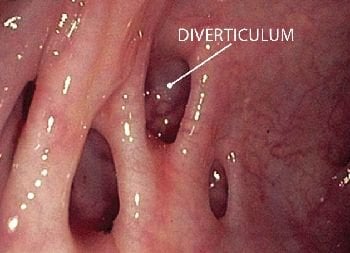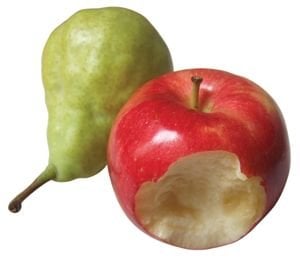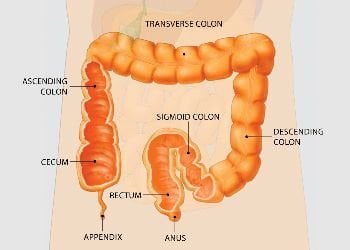This information was developed by the Publications Committee of the American Society for Gastrointestinal Endoscopy (ASGE). For more information about ASGE, visit www.asge.org. This information is intended only to provide general guidance. It does not provide definitive medical advice. It is important
Read more
This information was developed by the Publications Committee of the American Society for Gastrointestinal Endoscopy (ASGE). For more information about ASGE, visit www.asge.org.
This information is intended only to provide general guidance. It does not provide definitive medical advice. It is important that you consult your doctor about your specific condition.
Download this article in PDF format
Don't have Adobe Reader? Download it here
 Diverticulosis is a common condition in the United States that affects half of all people over 60 years of age and nearly everyone by the age of 80. Most people who have diverticulosis are unaware that they have the condition because it usually does not cause symptoms.
Diverticulosis is a common condition in the United States that affects half of all people over 60 years of age and nearly everyone by the age of 80. Most people who have diverticulosis are unaware that they have the condition because it usually does not cause symptoms.What is diverticulosis?
Diverticulosis is a condition in which there are small pouches or pockets in the wall or lining of any portion of the digestive tract. These pockets occur when the inner layer of the digestive tract pushes through weak spots in the outer layer. A single pouch is called a diverticulum. The pouches associated with diverticulosis are most often located in the lower part of the large intestine (the colon). Some people may have only several small pouches on the left side of the colon, while others may have involvement in most of the colon.
Who gets diverticulosis?
Diverticulosis is a common condition in the United States that affects half of all people over 60 years of age and nearly everyone by the age of 80. As a person gets older, the pouches in the digestive tract become more prominent. Diverticulosis is unusual in people under 40 years of age. In addition, it is uncommon in certain parts of the world, such as Asia and Africa.
What causes diverticulosis?
Because diverticulosis is uncommon in regions of the world where diets are high in fiber and rich in grains, fruits and vegetables, most doctors believe this condition is due in part to a diet low in fiber. A low-fiber diet leads to constipation, which increases pressure within the digestive tract with straining during bowel movements. The combination of pressure and straining over many years likely leads to diverticulosis.
 The easiest way to increase fiber intake is to eat more fruits, vegetables and grains. Diverticulosis is uncommon in regions of the world where diets are high in fiber and rich in grains, fruits and vegetables. Most doctors believe this condition is due in part to a diet low in fiber.
The easiest way to increase fiber intake is to eat more fruits, vegetables and grains. Diverticulosis is uncommon in regions of the world where diets are high in fiber and rich in grains, fruits and vegetables. Most doctors believe this condition is due in part to a diet low in fiber.What are the symptoms of diverticulosis?
Most people who have diverticulosis are unaware that they have the condition because it usually does not cause symptoms. It is possible that some people with diverticulosis experience bloating, abdominal cramps or constipation due to difficulty in stool passage through the affected region of the colon.
How is the diagnosis of diverticulosis made?
Because most people do not have symptoms, diverticulosis is often found incidentally during evaluation for another condition or during a screening exam for polyps. Gastroenterologists can directly visualize the diverticula (more than one pouch, or diverticulum) in the colon during a procedure that uses a small camera attached to a lighted, flexible tube inserted through the rectum. One of these procedures is a sigmoidoscopy, which uses a short tube to examine only the rectum and lower part of the colon. A colonoscopy uses a longer tube to examine the entire colon. Diverticulosis can also be seen using other imaging tests, for example by computed tomography (CT) scan or barium x-ray.
What is the treatment for diverticulosis?
Once diverticula form, they do not disappear by themselves. Fortunately, most patients with diverticulosis do not have symptoms and, therefore, do not need treatment.
When diverticulosis is accompanied by abdominal pain, bloating or constipation, your doctor may recommend a high-fiber diet to help make stools softer and easier to pass. While it is recommended that we consume 20 to 35 grams of fiber daily, most people only get about half that amount. The easiest way to increase fiber intake is to eat more fruits, vegetables and grains. Apples, pears, broccoli, carrots, squash, baked beans, kidney beans, and lima beans are a few examples of high-fiber foods. As an alternative, your doctor may recommend a supplemental fiber product such as psyllium, methylcellulose, or poly-carbophil. These products come in various forms including pills, powders and wafers. Supplemental fiber products help to bulk up and soften the stool, which makes bowel movements easier to pass. Your doctor may also prescribe medications to help relax spasms in the colon that cause abdominal cramping or discomfort.
 Bleeding in the colon may occur from a diverticulum. Intestinal blockage may occur in the colon from repeated attacks of diverticulitis. If left untreated, diverticulitis may lead to an abscess outside the colon wall or an infection in the lining of the abdominal cavity.
Bleeding in the colon may occur from a diverticulum. Intestinal blockage may occur in the colon from repeated attacks of diverticulitis. If left untreated, diverticulitis may lead to an abscess outside the colon wall or an infection in the lining of the abdominal cavity.Are there complications from diverticulosis?
Diverticulosis may lead to several complications including inflammation, infection, bleeding or intestinal blockage. Fortunately, diverticulosis does not lead to cancer.
Diverticulitis occurs when the pouches become infected or inflamed. This condition usually produces localized abdominal pain, tenderness to touch and fever. A person with diverticulitis may also experience nausea, vomiting, shaking, chills or constipation. Your doctor may order a CT scan to confirm a diagnosis of diverticulitis. Minor cases of infection are usually treated with oral antibiotics and do not require admission to the hospital. If left untreated, diverticulitis may lead to a collection of pus (called an abscess) outside the colon wall or a generalized infection in the lining of the abdominal cavity, a condition referred to as peritonitis. Usually a CT scan is required to diagnose an abscess, and treatment usually requires a hospital stay, antibiotics administered through a vein and possibly drainage of the abscess. Repeated attacks of diverticulitis may require surgery to remove the affected portion of the colon. Bleeding in the colon may occur from a diverticulum and is called diverticular bleeding. This is the most common cause of major colonic bleeding in patients over 40 years old and is usually noticed as passage of red or maroon blood through the rectum. Most diverticular bleeding stops on its own; however, if it does not, a colonoscopy may be required for evaluation. If bleeding is severe or persists, a hospital stay is usually required to administer intravenous fluids or possibly blood transfusions. In addition, a colonoscopy may be required to determine the cause of bleeding and to treat the bleeding. Occasionally, surgery or other procedures may be necessary to stop bleeding that cannot be stopped by other methods. Intestinal blockage may occur in the colon from repeated attacks of diverticulitis. In this case, surgery may be necessary to remove the involved area of the colon.
Download this article in PDF format
Don't have Adobe Reader? Download it here
-
Understanding Diverticulosis
Category: Understanding Diverticulosis
Our Location
Find us on the map
Hours of Operation
Our Regular Schedule
Stephen K. Buto, M.D.
Monday:
9:00 am-12:00 pm
2:00 pm-4:30 pm
Tuesday:
9:00 am-12:00 pm
2:00 pm-4:30 pm
Wednesday:
9:00 am-12:00 pm
Thursday:
9:00 am-12:00 pm
2:00 pm-4:30 pm
Friday:
9:00 am-12:00 pm
2:00 pm-4:30 pm
Saturday:
Closed
Sunday:
Closed

 Since its founding in 1941, the American Society for Gastrointestinal Endoscopy (ASGE) has been dedicated to advancing patient care and digestive health by promoting excellence in gastrointestinal endoscopy. ASGE, with more than 11,000 members worldwide, promotes the highest standards for endoscopic training and practice, fosters endoscopic research, and is the foremost resource for endoscopic education.
Since its founding in 1941, the American Society for Gastrointestinal Endoscopy (ASGE) has been dedicated to advancing patient care and digestive health by promoting excellence in gastrointestinal endoscopy. ASGE, with more than 11,000 members worldwide, promotes the highest standards for endoscopic training and practice, fosters endoscopic research, and is the foremost resource for endoscopic education.